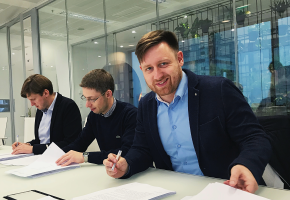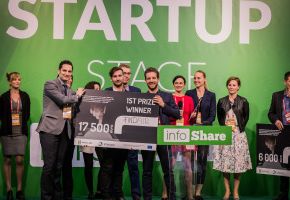 30.11.2017
30.11.2017
Speed Dating: 15 Minutes That Can Change a Startup’s Life - as Well as the Investor’s
We were thrilled to find out about the cooperation between ARIA Fund and Livespace in November 2017. The story started at infoShare 2017! Let’s talk to Kacper Bujalski – Partner at ARIA Fund – and ask him how he got a startup to follow in the footsteps of their investment projects.
IS: Let’s begin with some information about the fund, your investments and their progress, a quick self-promo.
We invest in people who work on interesting projects which already exist and generate considerable income. This means that we don’t invest just in nice presentations. We’re interested in potential for international expansion. We want to provide new technologies to global users. Additionally, we invest in things that we understand. We are mostly interested in B2B XaaS solutions but we’re also open to other industries.
Our investment ticket size is EUR 1-4 million, focusing on the upper range. The capital is fully provided by private investors.
We represent a „hands-on” approach – we get involved in the life of the project. After signing the investment agreement, we roll up our sleeves and start helping the startup’s founders to build the business. I often stress that we don’t only want to hear about success - we also want information about the challenges, especially potential upcoming difficulties – to react, advise and prevent. I’m very happy when I get a message from a startup founder or a team with a description of the problem and a request for help. We prefer to be treated as a business partner rather than just a capital provider.
IS: We recently heard about your investment in Livespace, which resulted from a speed dating meeting at infoShare 2017. We’re very happy for you! What makes you decide to spend 15 minutes with a specific company? What triggers a positive decision about a meeting and what makes you turn down an invitation?
We met Livespace at the infoShare party, a day before the conference. We found common ground while exchanging opinions on new technologies. In effect our meeting resulted in an investment contract signed a few months later. Events like infoShare give solid benefits in the future as long as you meet new people instead of spending the whole time among your own friends. It’s a great exchange of inspiring ideas and know-how.
We had quite a big team at Speed Dating – 4 people! Sometimes we had too few chairs and this year we might come with a bigger crew, so watch out.
Unfortunately, some startups hadn’t prepared hard enough and 90% of the invitations were without profile descriptions, or they were incomplete or simply messy. Some startups sent invitations to all funds from A to Z without considering their investment strategies. I hope this problem will be solved next year...
In the end we printed company profiles of all Speed Dating participants. We added info found online to each profile. We searched their websites, registered for free trials and explored the products. In the end we chose 5 companies for the meetings.
IS: I bet there are many startups who are hoping for similar results after infoShare 2018. What should they have done to prepare a productive meeting? What questions can they expect?
Mature projects don’t have to prepare much. They have 15 minutes to show us the product, their plans for development and expansion. We want to hear about the monthly revenue, the invested capital, the cap table and the number of users.
There are 3 scenarios of what might happen after the meeting: (1) there’s chemistry, we approach the startup again, keep talking to get more details; (2) the project is OK, we send an email 2 weeks after we return to office – something might come of it; (3) forget it.
IS: How does an investor prepare for meetings at conferences?
Despite appearances, we do more than just attend events and audition startups. We work hard to prepare, check who might be interesting for us to meet. On this basis we decide if we’re going to the event and who we’re sending.
IS: How do you find projects? Where do they come from? Are networking and recommendations important? Do projects outside of startup media or not created by people from the startup ecosystem have a chance at being successful?
Every week we get a few projects. Some are more interesting, some less. A few times we started talking but we have never made an offer to a project that just landed into our mailbox – yet.
We follow the market on a regular basis, desperately seeking for hypergrowing startups, but usually we target companies that grow well and set a meeting directly or via a common friend. In one case the company was just finishing the preparation of material for a financing round when we reached them, so they were happy to meet us. Few months later we signed an investment contract and we started to develop business together. For me it’s crucial to have good relations with the founders and their team as well to know their potential for doing great things.
Sometimes we get projects recommended to us. I divide them into 2 groups: (1) they come from qualified people who understand the business and know how ARIA works; (2) they come from closer or further friends who I don’t cooperate with on a business level. I treat the first group as very valuable recommendations and I always find time to analyze the projects in detail even if I wasn’t impressed at the first sight. I treat the second group as “inbox projects”.
My personal favorites are projects that are not searching for financing at all. I’m not much for hype and startups that win every gala instead of being really focused on business.
Once I found this sentence online: “lots of noise, but little traction” and I'm sorry to say it describes the situation on the Polish market in 90%. If I’m to advise anything, I’d tell startups not to forget about communication. Brag about your progress from time to time – simply to leave an impression online in case times change and you become interested in finding additional capital for your development. Don’t turn into a startupper who swaps university parties for startup industry parties. Your task is to grow the business.
IS: The beginning of a year is a good time for assessments. What was the most positive surprise for you in 2017? And what was the biggest disappointment?
I'm very positive about the Softbank fund with its USD100bn capitalization and the size of their investments per project. The biggest disappointment is certainly UBER – the problems within the organization, trouble on various markets. I hope they succeed with autonomous taxis.
IS: And what would you highlight as the trend for 2018?
Maybe not as a trend, but surely the tendency to complain about cryptocurrency regulations and the aggressive development of blockchain.
IS: And the last question: what are ARIA Fund’s plans for next year?
First of all, we want to add 5 projects to our portfolio. We also always plan to support the current portfolio investments. In this context, it’s worth mentioning that on the 1st of January we started to cooperate with Amazon, which made it possible for us to utilize the resources of Amazon Web Services. For all our companies this will generate significant savings in upcoming years, making more intense product development possible.
In one of our projects we’re preparing a share issue, in another one we’re talking with investors about the next round. I’d like at least two of our companies to receive next round founding this year to enable quicker progress. We have a big project, already in operation - establishing a 3rd fund focused on early stage projects (but already with an MVP and a traction).
Tags:
See also:
LATEST NEWS
Nowoczesna aplikacja — jaka jest i jak ją stworzyć? 19.04.2024
Feedback czy rada? O mentoringu w świecie IT 18.04.2024
Influencerofobia — Wy też ją macie? Sprawdźcie to, podczas Infoshare! 17.04.2024
Infoshare bez barier — accesibility na naszej konferencji 11.04.2024
Ograniczenia istnieją tylko w głowie — czy ADHD może być zaletą w świecie biznesu? 04.04.2024


